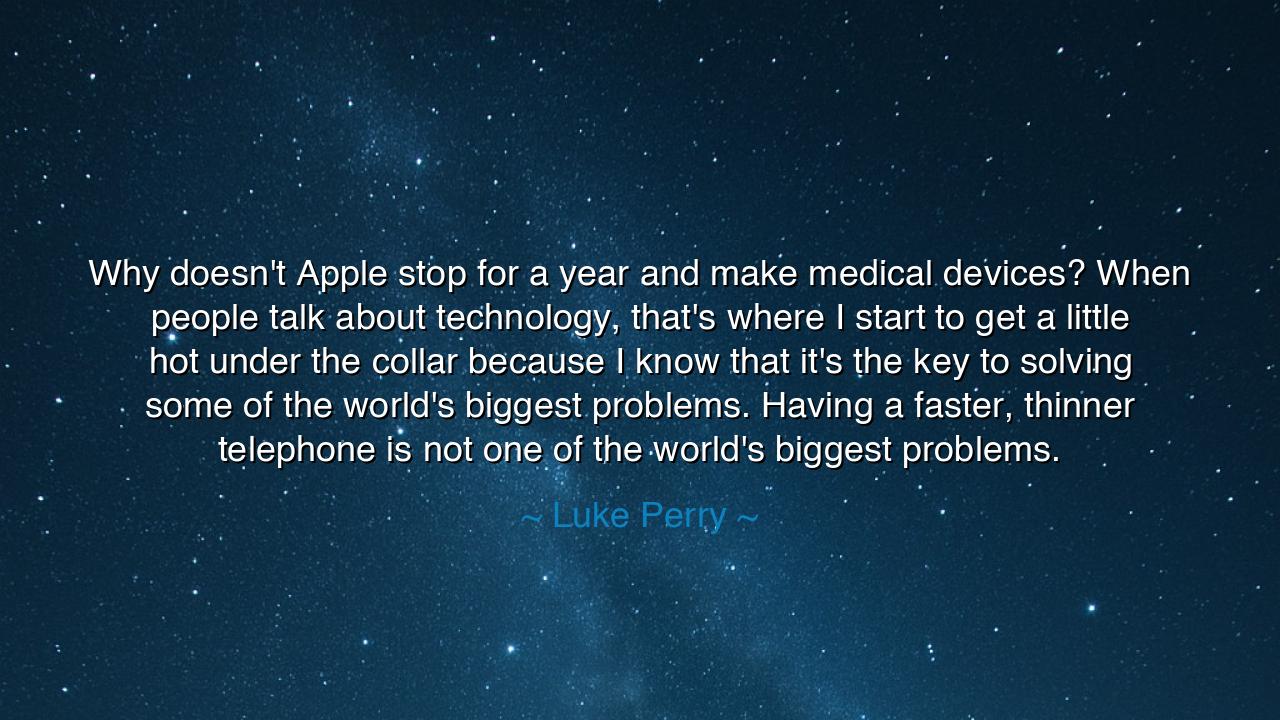
Why doesn't Apple stop for a year and make medical devices? When
Why doesn't Apple stop for a year and make medical devices? When people talk about technology, that's where I start to get a little hot under the collar because I know that it's the key to solving some of the world's biggest problems. Having a faster, thinner telephone is not one of the world's biggest problems.






The words of Luke Perry—“Why doesn’t Apple stop for a year and make medical devices? When people talk about technology, that’s where I start to get a little hot under the collar because I know that it’s the key to solving some of the world’s biggest problems. Having a faster, thinner telephone is not one of the world’s biggest problems.”—resound with the voice of conscience, the cry of one who sees beyond glitter and novelty. His statement is not an attack on invention, but a call to direct invention toward the wounds of humanity. For what good is it to polish the mirror of convenience if we neglect the broken body, the fragile heart, the suffering multitudes?
In his words lies the contrast between trivial advancement and meaningful progress. A thinner phone dazzles the eyes, but does little to ease the suffering of the sick. A faster device entertains, but does not heal the child in pain. Perry, with righteous impatience, reminds us that true technology should aim not at vanity, but at salvation—that its noblest purpose is not to amuse, but to save. To hear him is to hear the voice of ancient philosophers who warned against mistaking luxury for wisdom, or comfort for virtue.
History gives us a vivid example in Jonas Salk, who chose not to chase riches or trivial inventions, but to devote his genius to the creation of the polio vaccine. At a time when children were crippled and families lived in fear of this plague, Salk’s dedication transformed the world. He refused even to patent the vaccine, declaring, “Could you patent the sun?” His path shows what Perry calls for: technology directed not toward smaller luxuries, but toward humanity’s greatest needs. One man’s choice to serve the sick lifted terror from millions.
The emotional force of Perry’s words comes also from their urgency. He does not speak as a detached thinker, but as one stirred to frustration—“hot under the collar”—because he knows the potential locked in the tools of technology. He recognizes that we already possess the knowledge, the resources, the brilliance to heal much of what afflicts the world. What we lack is not ability, but will. Too often, profit blinds purpose, and convenience eclipses compassion. His words are a plea to awaken, to direct our collective power toward what truly matters.
There is also a heroic challenge in his statement. He dares to ask: what if even the mightiest corporations shifted their gaze for a moment from wealth to wellness? Imagine, he implies, if the billions spent on designing thinner glass and faster chips were instead spent on curing cancer, preventing heart disease, or creating devices to aid the disabled. The ancients told us that greatness lies not in what one can do, but in what one chooses to do. Perry calls us to choose rightly: to wield technology as a sword of healing, not merely as a toy of luxury.
The lesson for us is clear: we must demand that innovation be tethered to compassion. In our own lives, this means honoring those who use their talents for the greater good, and supporting inventions that uplift humanity, not just amuse it. It means asking ourselves daily: am I using my knowledge, my tools, my creativity to serve what is trivial, or to serve what is vital? Each person may not build medical devices, but each can align their labors with what brings genuine healing to others.
Thus, Luke Perry’s words endure as both rebuke and prophecy: the purpose of technology is not speed, nor thinness, nor novelty, but healing, saving, and solving the great problems of the human race. Let us not be blinded by glitter when lives are at stake. Let us, in every field, direct our strength to the places of greatest need. For in doing so, we will not only build machines—we will build a future worthy of our humanity.






AAdministratorAdministrator
Welcome, honored guests. Please leave a comment, we will respond soon